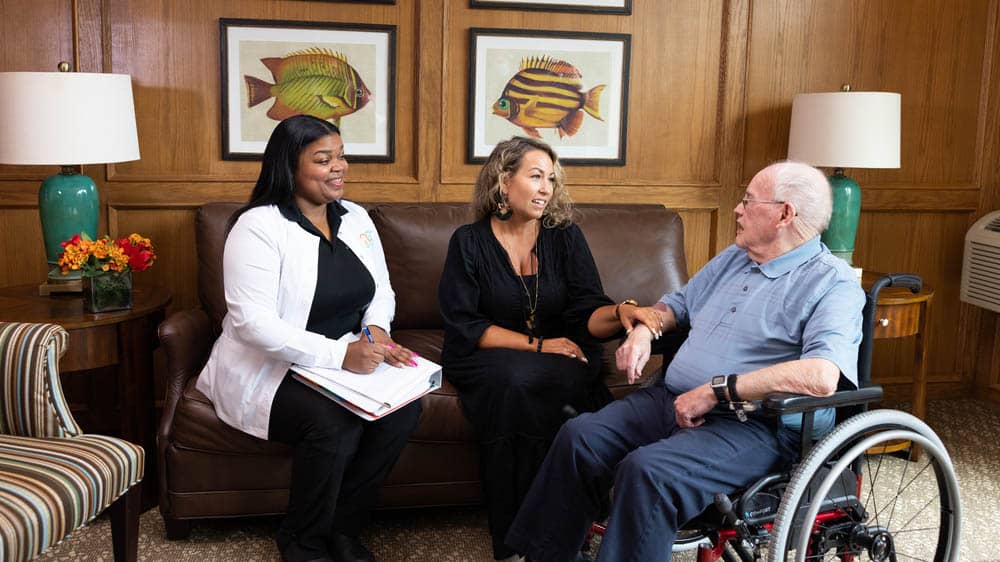

Preparing for Emergencies
Television viewers worldwide are enraptured with drama series featuring harrowing medical emergencies, disasters, traumas and rescues. But succumbing to sudden chest pain or fighting off floodwaters approaching your own home is not a fictional drama. Real-life emergencies can happen anywhere, anytime. Are you prepared? Emergencies of all types can occur, from health crises to natural and man-made disasters. Sudden or severe physical symptoms can be life threatening, particularly for the senior who lives alone and cannot summon immediate help. Living in an at-risk area where the fury of Mother Nature unleashes tornadoes, hurricanes, wildfires, blizzards or other weather-related events calls for being prepared—before the emergency erupts.
Consider the following resources on emergency preparedness any time of year:
Establish a plan for emergencies
- Identify a circle of people who can offer hands-on assistance in emergencies—family members, friends, professional caregivers, relatives, neighbors and business associates.
- Work with this support network to create an agreed-upon emergency plan. Important details to highlight in the plan include emergency medical treatment options, relevant emergency documents/health information, home escape routes, transportation needs, community response and evacuation plans, and family/friend communication contacts.
- List safe places to shelter in the home, and note where to secure safe lodging within the community and outside the area.
- Select a main contact person who will check on you during an emergency. Consider means of communication (knock on door, etc.) if telephone service is down.
- Determine an action plan for those with health limitations who may need physical assistance during an emergency. The Centers for Disease Control and Prevention recommends, “If you have medical, transportation, or other access needs during an emergency, consider signing up for SMART911, Code Red, or your local county registry, depending upon which service your area uses to help first responders identify people who may need assistance right away.”1
- Safeguard copies of important documents such as insurance and financial records, birth certificates, Social Security cards, passports and wills in a fire-protected container or at a separate location.
Organize an emergency supply kit
- Be aware that in an emergency, you may not have time to collect essential supplies. Basic services such as water, gas, electricity and communications may be disrupted. Grocery stores, gas stations and pharmacies may be closed or overwhelmed with lengthy lines.
- Prepare your own emergency supply kit now before any medical alert or disaster situation arises. Assemble and place the following preparedness items in a seal-tight plastic bin, waterproof duffle bag or wheeled carrier that is easy to transport:
- First aid kit and first aid manual.
- Flashlight and extra batteries.
- Adequate supplies of water, nonperishable food, medications, hygiene items, etc. for a minimum of three days.
- Hearing aids, eyeglasses and/or supplies for contacts, and other assistive devices.
- Blankets, and if room, a sleeping bag.
- Extra clothing and comfortable walking shoes or warm boots.
- Cash and coins since ATMs may be inaccessible.
- Cellphone with charger.
- Supplies for pets or service animals.
- Keep the emergency supply kit in a handy place, and be sure to include your identification and contact information for family and friends.
- Stock a vehicle supply kit that includes jumper cables, a tire repair kit and flares. In summer, your vehicle supply kit should include sunscreen, shade-providing hat and extra water. A wintertime kit should include tire chains, ice scraper/snow brush, and warm clothes, gloves and boots. Review the supply kit’s contents and update supplies every six months or with seasonal changes.
Identify community resources
- Emergency warning systems—It is pertinent to know how your community will warn you of an impending disaster and stay in contact with you during and after an area emergency. Local authorities may use a Reverse 911 call system to warn of dangers, and you will need to register in advance for this free community communication system. Also, find out which local television and radio stations will broadcast emergency messages via the Emergency Alert System. You can also get emergency alerts via smartphone with the Wireless Emergency Alert, or receive SMS (Short Message Service) text or email alerts from the National Weather Service. Check in advance which community first responders (fire, ambulance services, etc.) will go door to door with emergency warnings and evacuation orders.
- National Oceanic and Atmospheric Administration (NOAA) Weather Radio All Hazards—The NOAA offers a 24-hour network of VHF (very high frequency) weather radio stations that will send out the earliest warnings of hazardous weather and other disasters and civil emergencies in your area. Contact your local National Weather Service office or visit nws.noaa.gov/nwr for more information.
- Local hospitals—As communities expand and offer more medical facilities, you may not realize which hospital or freestanding emergency clinic is closest to you. To find a nearby hospital, visit the American Hospital Directory.
- Government support services—The Federal Emergency Management Agency (FEMA) can provide disaster assistance for individuals and businesses. FEMA also offers specialized support for those with disabilities or access or functional needs. The FEMA helpline is 800-621-3362 / TTY 800-462-7585. For online information and resources, visit fema.gov/individuals-disaster-assistance. FEMA’s mobile app can connect you with weather warnings and resources on disaster preparation, aid and shelter. The U.S. government also coordinates nationwide disaster-related efforts via the Disaster Services Unit and the Office of Human Services, Emergency Preparedness & Response.
- Support services from local organizations—Many of the federal and state emergency response agencies have community-level teams to help in times of disaster. The local Office of Emergency Management and fire department and emergency response teams are invaluable resources. The American Red Cross and Salvation Army are two well-established disaster relief organizations that provide services locally, such as mobile feeding stations, water, shelter, first aid and other recovery supplies. For shelter resources, text 4FEMA (43362) and enter SHELTER and your ZIP code. For Spanish, text REFUGIO (7338446) and enter your ZIP code. A Community Emergency Response Team, neighborhood watch, faith-based organizations, community block associations and other locally organized public service groups also assist with emergency preparedness and response in time of a disaster or medical emergency.
Doing some homework and planning upfront will reduce stress and scrambling if and when a medical emergency or disaster alert arises. No one needs to be caught off guard in times of crisis. Every action you take now can make a life-or-death difference in the future.







